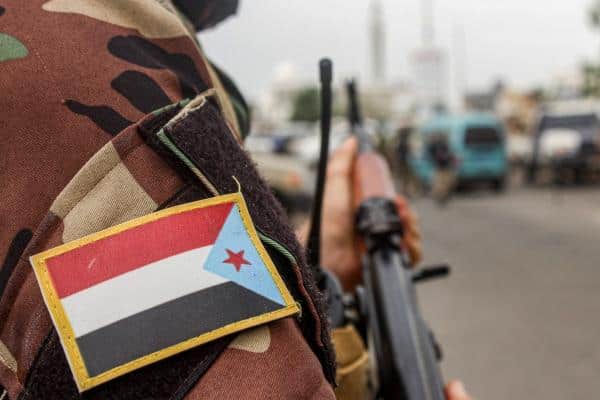
Last updated on: 30-10-2025 at 5 PM Aden Time
New York (South24 )
After the failure of the new round of the international efforts to persuade the Houthis to reach a ceasefire, the international narratives focus again on the importance of the Riyadh Agreement to avoid the outbreak of an “all-out conflict” between the “nominal” allies in South who oppose the Houthis.
In this regard, the outgoing U.N. Envoy to Yemen, Mr. Martin Griffiths, and the Deputy to the U.S. Ambassador to the United Nations, Mr. Jeffrey Prescott stressed the importance of adhering to the agreement signed in November 2019 in Riyadh between the Southern Transitional Council (STC) and the government of President Abdrabbu Mansur Hadi.
With the international efforts to persuade the Houthis to a ceasefire have reached a deadlock, the international community clings to avoid, at least, another conflict in South.
Such a conflict would give the Iran-backed Houthis more gains during “the world’s worst man-made humanitarian crisis” according to Griffiths.
Disagreement over the future of Yemen
In his address to the U.N. Security Council Tuesday, Mr. Griffiths said that “the war has also exacerbated divisions in the southern governorates. The situation there has come perilously close on several occasions to all-out conflict”. [1]
“And for the sake of the peace process that we have in front of us these monthly briefings, for the sake of that process as well as hopes of longer-term stability, the partnership established between the Government of Yemen and the STC” he added.
Although the “mistrust runs deep and there are major differences of opinion on how the future of Yemen should look”, he said that “the only way out of this quagmire is for the leadership of the Government of Yemen and that Council to commit as they have done in the Riyadh Agreement to resolve their differences through dialogue now and through political negotiations in the longer term”.
For his part, Mr. Jeffrey Prescott called on the Yemeni Government and the STC to make the interest of the Yemeni people their top priority and to resolve their disputes.[2]
He added that the “Yemeni people need a unity government which could provide services and assumes leadership during this time of the crisis”.
Essential for stability
Washington expressed its optimism towards the outcome of the recent negotiations about the implementation of the Riyadh Agreement between the government and the STC which has been resumed.
In a separate statement Tuesday evening, the U.S. State Department praised the Saudi efforts to push forward the Yemeni peace process noting that the Riyadh Agreement is essential for stability and security in Yemen. [3]
The US State Department said that Tim Lenderking, the U.S. Special Envoy for Yemen, is heading to Saudi Arabia to hold talks with Saudi and Yemeni officials as well as the U.N. Envoy to Yemen.
In Riyadh, the Saudi team, assigned to implement the Riyadh Agreement, met with representatives of the STC and the Yemeni government.
“There was a positive atmosphere in the meeting as they stressed on the need to reach a total de-escalation and to make the necessary arrangements to protect the government and secure its return to Aden as well as to pursuit the implementation of the Riyadh Agreement”[4] according to the Saudi Press Agency.
In Riyadh, Dr. Nasser Al Khubaji , Head of the STC’ Negotiations Affair Unit met Tuesday with Mr. Cristopher Deutsch, the Acting Deputy of U.S. acting Ambassador to Yemen, to discuss the implementation of the remaining items of the Riyadh Agreement.[5]
Dr. Al-Khubaji praised the efforts led by the U.S. Envoy and the strategy adopted by the news U.S. administration to end the war and bring peace through entering a comprehensive political process that embraces all issues and active forces on the ground.
People with power
The remarkable shift of the international narratives towards the Riyadh Agreement after the Houthis refused the U.N. envoy’s proposals about a national ceasefire and opening both Sanaa Airport and Al Hudaydah port.
Mr. Jeffrey Prescott noted that the Houthis refused to participate seriously in the ceasefire negotiations or to take steps to resolve the conflict that has been going for 7 years.
They have even refused to discuss a ceasefire with the U.N. Envoy to Yemen and they continue their devastating attack on Marib instead.
Mr. Griffiths blamed those whom he called “people with power” for the consequences of continuing the war and the deteriorating humanitarian situation.
“People with power have missed the opportunities presented to them, to make the necessary concessions to end the war. As a result, Yemenis are obliged to live under violence, insecurity, and fear, with limits to their freedom of movement, and freedom of expression. And perhaps most tragically of all, we are a witness to the hopes and aspirations of a generation of young Yemenis for a peaceful future being dashed” he concluded.
The STC, the most prominent force in South Yemen, calls for restoring the Southern State that existed until 1990.
The STC holds today the fourth parliamentary session of its affiliated legislative body, the National Assembly, in the capital city of Aden.
- South24 Center for News and Studies
- Photo: A fighter loyal to the Southern Transitional Council in Aden, Yemen on August 27, 2020 [Saleh Al-Obaidi/AFP/Getty Images]